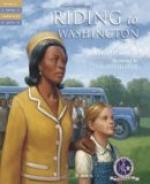“‘Throp,’ shoo said, ‘we’ll noan be through wi t’ wark by midneet.’
“‘Then we sal hae to give ower,’ said Throp. ‘It’ll be Sunday morn i’ a quairter of an hour, an’ I’m noan baan to work o’ Sunday.’
“When Throp’s wife heerd that shoo burst out a-roarin’. ’I’m an idle good-for-nowt,’ shoo said. ‘Eh! but I mun finish t’ bag; I mun, I mun.’
“‘I’m noan baan to work when t’ clock has struck twelve,’ Throp said agean, ‘nor let thee work, nowther. I’m a deacon at t’ Independent Chapil, an’ I’ll noan let fowks say that they saw a leet i’ wer kitchen, an’ heerd thy wheel buzzin’ of a Sunday morn.’
“When Throp’s wife heerd that, shoo fell to roarin’ agean, for shoo knew they’d noan be through wi’ t’ spinnin’ while a quairter past twelve. But at lang length shoo turned to Throp an’ shoo said: ‘Let’s put t’ clock back, an’ then, if onybody’s passin’ an’ looks in on us, an’ wants to know why we’re workin’ of a Sunday morn, we can show ’em t’ clock.’
“Throp said nowt for a bit; he was a soft sort o’ a chap, an’ didn’t want to start fratchin’ wi’ his wife. So just to please her, he gat up on to t’ stooil an’ put back t’ hands o’ t’ clock twenty minutes. An’ t’ clock gave a despert gert groan; ‘twere summat atween a groan an’ a sweer, an’ it went straight to Throp’s heart, an’ he wished he’d niver melled wi’ t’ clock. Howiver, he com back to his cardin’, an’ when t’ clock strack twelve, t’ bag o’ wool were empty, an’ there were a gert hank o’ spun yarn as big as a man’s heead. Throp looked at his wife, an’ there were a glint in her een that he’d niver seen theer afore; shoo were fair ditherin’ wi’ pride an’ flustration. ’Fowks san’t say “Thrang as Throp’s wife” for nowt,’ shoo said, and shoo gat up off t’ stooil, sided away t’ spinnin’-wheel, an’ stalked off to bed wi’ Throp at her heels. Eh! mon, but ‘twere a false sort o’ pride were yon.”
“Did people find out about putting the clock back?” I asked.




